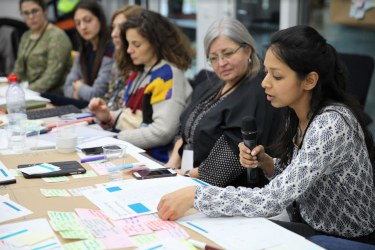Andrew Whittington-Davis
On the 18th of March, the SySTEM 2020 team was introduced to new faces in Helsinki, Finland. Partners, third parties and young learners came together to ideate and co-design options for the future of informal learning.
We all hold a degree of expertise – our background, upbringing and life experiences provide us all with a rich amount of knowledge and experiential expertise. By utilising a range of learners and educators we were able to address a range of common problems found within out of school learning initiatives. The topics discussed were broad, but by the end of day one, three common issues were raised.
1. How do we increase inclusivity in science learning outside the classroom?
2. Should and how can accreditation be devised and awarded to young learners taking part in science learning outside the classroom?
3. Lastly, how do we engage and connect with young learners with science learning outside the classroom - what is it about their environment that may push them towards or away from science?
However, outlining the problems facing science learning outside the classroom was not the only purpose of this meeting. In reply to these problems, educators and learners collaborated to co-design solutions to address and overcome these problems. From new committees in the local council for young learners to join, providing a new voice for STEAM subjects and the community, to creating a badge system that accredits and certifies involvement in initiatives that provides informal learning. By the end of the two days, a total of 12 designs were showcased, and over the next few months, some will be chosen to be prototyped and put into action. As Science Gallery Dublin’s Philip Smyth said to conclude the discussion:
“A smart future is one with options”

